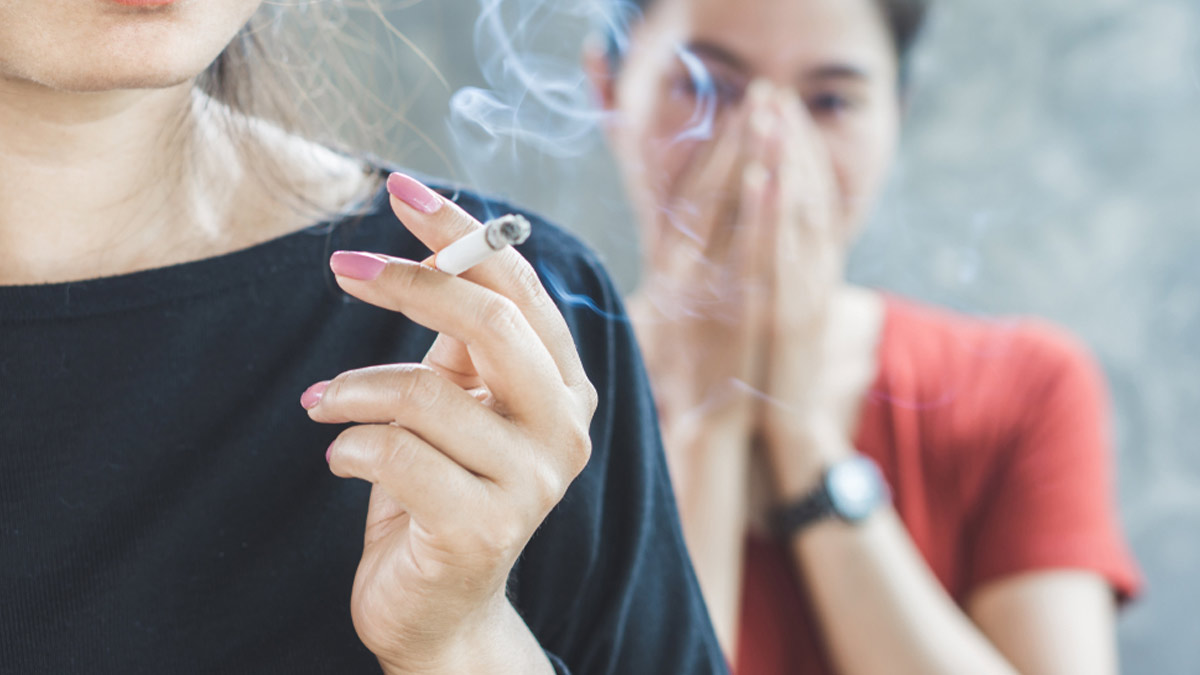
Do you join your smoker friends for ‘chai-sutta’ break feeling FOMO (Fear Of Missing Out)? Do you accompany them to learn all the gossip around the office and think that because you are not smoking, you are free from the dangerous effects of it? My friend, let me break it to you, but inhaling the air in the environment where your friends are smoking is as harmful for you as smoking a cigarette yourself.
Passive smoking, also known as secondhand smoke, is the unintentional inhalation of smoke by non-smokers who are nearby a smoker. It’s an invisible enemy that lurks in public spaces, homes, and even cars. While the smoker may enjoy their cigarette, the surrounding people, including children and pets, are unwittingly exposed to a cocktail of harmful chemicals. Let’s dive into the smoke (pun intended) and clear the air on this crucial health topic.
To get a detailed explanation on the side effects and health risks of passive smoking, OnlyMyHealth spoke to Dr Sheetal Chaurasia, Consultant - Pulmonary Medicine, Manipal Hospital, Whitefield, Bengaluru.

What Exactly Is Passive Smoking?
Defining passive smoking, Dr Chaurasia said, “Passive smoking or environmental tobacco smoke, refers to the inhalation of cigarette smoke by a non-smoker who is in close proximity to a smoker and inhales the smoke exhaled by the smoker. Passive smoking is more harmful than smoking because it consists of a mixture of mainstream smoke (exhaled by the smoker) and side-stream smoke (released from the burning end of a cigarette, cigar, or pipe).”
Also read: World No Tobacco Day 2023: 10 Strategies To Help You Quit Smoking
According to her, the fumes that emanate from the end of a cigarette contain more harmful substances than the smoke inhaled by the smoker, as they do not pass through a filter. The particles are also smaller, which allows them to stay longer in the air and penetrate deeper into the lungs. As per studies, second-hand smoke causes approximately 7,330 deaths from lung cancer and 33,950 deaths from heart disease each year.
Health Risks of Passive Smoking
Passive smoking has significant health effects. Below are a few notable adverse health effects of passive smoking listed by Dr Chaurasia.

1. Chemicals and noxious gases contained in second-hand smoke affect the nose, sinuses, and respiratory system in the same way they affect the smoker. It may also cause nasal allergies, bronchitis, and chronic obstructive pulmonary disorder (COPD).
2. It can cause the worsening of pre-existing lung diseases like asthma and COPD. Chronic exposure may also precipitate respiratory failure.
3. Exposure to second-hand smoke increases the risk of heart disease.
Also read: Tobacco Cessation Counselling Can Help Quit Smoking, Doctor Explains In Detail

4. It causes accelerated lung function decline and is a significant risk factor for developing infections and pneumonia.
5. Exposure to second-hand smoke is a significant risk factor for developing cancer of the aero-digestive tract.
6. Pregnant women exposed to environmental tobacco smoke are at risk of complications such as premature delivery, low birth weight, and poor lung development in their children.
7. Passive smoking is especially harmful to children, as they have less well-developed airways, lungs, and immune systems. Children who live with a smoker are more likely to develop multiple health issues like bronchitis, asthma, chest infections such as pneumonia, ear infections, and frequent coughs and colds.
8. While travelling in a car where one person is smoking, second-hand smoke can reach hazardous levels even with the windows open.
Conclusion
Passive smoking is a serious health risk that affects millions of non-smokers. By recognizing the signs and understanding the dangers, you can take steps to protect yourself and your loved ones. Let’s clear the air and work towards a smoke-free future—because your health is worth it! Stay healthy, stay informed, and remember: where there’s smoke, there’s a health risk.
Also watch this video
How we keep this article up to date:
We work with experts and keep a close eye on the latest in health and wellness. Whenever there is a new research or helpful information, we update our articles with accurate and useful advice.
Current Version